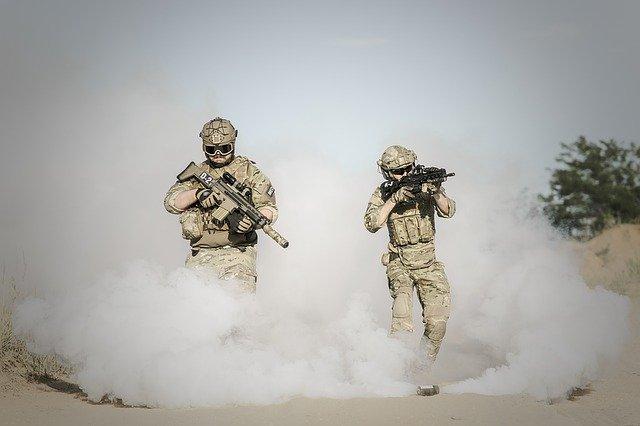Private military contractors jobs are available in many places and those interested want to know the duties, salary, and job outlook. So, you decide to retire from the military. You worked hard to be all that you can be and now need a new purpose for the rest of your life.
However, for some, it is difficult to just walk away from what you do best. Becoming a simple citizen is not always for those who have found that serving their country is more than a career, it’s a lifetime commitment.
Whether you were a Marine, Sailor, Soldier, or Airmen, serving is in their blood. Choosing to become a Private Military Contractor will give them a purpose and help them perform and excel at their job.

What is a Private Military Contractor?
Similar Job Titles: Private Military Contractors, Security Contractors, or Mercenary
A private military contractor (PMC) is a company providing military and security services to governments and other entities. These services could range from providing armed guards and bodyguards, to training soldiers and assisting in military operations. PMCs are often used in cases when there are too few government-funded military resources or personnel to meet the security needs of certain countries.
What are private military contractors used for? Most of the time they play a defensive role. However, there are times when they must react otherwise. In addition, Contractors primarily operate in war zones or assist other military personnel in combat situations, if attacked.
PMC companies employ these contractors to fill in where gaps may be present or located throughout the US military or service personnel. PMC companies became more popular or needed during the turn of the 21st century. In fact, PMC companies started when large firms hired these ex-military experts as part of the second-largest wave of contractors flown into Iraq.

What is the Difference Between a PMC and a Mercenary?
How do I become a mercenary? Historically, another term for a PMC is a Mercenary. Unfortunately, some PMCs have gotten a bad reputation, due to this term. However, this is not the best or most accurate description of PMCs. In fact, many have proved their worth by building a good rapport with those they are in contact with off and on the field.
Additionally, most people refer to mercenaries as single individuals and the word has a vigilante connotation. Whereas PMCs work for organizations with rules, leaders, and accountability.

Tasks Done by a Private Military Contractor
These professionals perform security, intelligence, and combat for money in military hot spots around the world. The job duties of private military contractors may include fighting against terrorism, conducting counter-drug operations, and protecting employees on oil fields or rigs. They may also guard political dignitaries or politicians. Additionally some private contractors train security personnel on-site and assist the police.
However, some may even guard government buildings and corporate headquarters against being targeted. Patrolling corporate buildings that may be at risk of terrorism is also the job duties of a PMC. Their job or position is very different, compared to those working as a bodyguard or security officer. This is because security contractors typically work in complex situations such as war zones. And, they may work unusual shifts like a posting full time for 30 days straight.

What is the Salary of a Private Military Contractor?
Do private military contractors make a lot of money? Compensation depends on the contracting company, the type of contract being offered, and other various factors. On average, a private military contractor may make $200,000 to $250,000 per year. The frequency of pay also varies. Some PMCs will pay daily, however, some may not pay until the assignment is complete. Daily pay rates can run from $500 to $1,000, and up to $400,000 per year, depending on the company.
Additionally, salaries are higher for contractor personnel with specialized skills such as pilots and special operations personnel. So, the most experienced and skilled PMC employees are able to command higher salaries.

How is the Salary of a Private Security Contractor Calculated?
In most cases, the rate of pay depends on the geographic location where the military contractor is sent and the level of risk involved in the assigned task. Generally, rates of pay from these private organizations may include hourly wages, contract fees, retainer fees, bonuses, or even a percentage of profits from a specific venture. Many companies also offer compensation for benefits such as health insurance, life insurance, and disability insurance.
- Experience: The longer an individual has been working in the field of PMC, the more their salary may be.
- Type of Projects Handled: More complex project or larger projects may result in higher salaries.
- Number of Projects Handled: The more projects handled by a Private Security Contractor, the more their salary may be.
- Level of Responsibility: Basically the higher responsibility, the higher the salary.
- Certification: Companies may factor in certifications in rewarding better salaries upon a PMC.
- Education: More prestigious PMC programs or higher degrees may be rewarded with better salaries.
- Assigned Location: Salaries often depend on local supply and demand.
- Demand for the Skill: There may be a higher salary for those with in-demand skills. For example, individuals who work in cybersecurity or who have elite force military experience typically earn more.
- Company Size: Generally larger companies may pay more for the same job.
- Bonus: Depending on a variety of factors, a bonus may be factored in.

What Are Some Qualifications to Become a PMC?
Is it hard to become a private military contractor? To qualify as a PMC, one must have a military or law enforcement background, have specialized military skills, and be physically fit. Staying in shape keeps the PMC ready for action at any moment called upon. Possessing a strong military background with special ops experience is a plus. Also, an outstanding record of achievements will allow the contractor to be chosen for top clearance projects.
Many PMC companies require a performance test as part of your contract. Also, a private military contractor must provide evidence of no prior felony charges or charges against their record. You must have a clean criminal record.
Having an updated resume on hand is essential when looking for a PMC job. In some cases, a DD214 security clearance may be required for employment. Once you apply for a job as a Private Military Contractor, it may take up to six months to a year to be accepted and hired. Having a degree in Communications, Criminal Justice or Emergency Management may also benefit the PMC.
Other courses or training available to the PMC are Tactical Shooting, Firearms instruction, and Counter-terrorism. In addition, those who have prior career experience in law enforcement on either the federal, state or local levels will make for a great private military contractor. Overall, the military training required for the position is going to be intense.
Enjoy smooth and secure payments at top online casinos in the Philippines with Casino10 by visiting casinophilippines10.com/gcash/.
What Private Military Contractors Pay the Most?
Although there may be hundreds of companies that send PMCs overseas or in areas where they are most needed. Most of these security contractors work hard to help their fellow military service member build a better tomorrow. Below are some popular PMC companies.
| Company | Website |
|---|---|
| AdvanFort Maritime Security | website |
| Aegis Group, a Garda World company | website |
| AKE Group International | website |
| Allied Universal | website |
| Amentum | website |
| CACI International Inc | website |
| Constellis Company, formerly Triple Canopy | website Triple Canopy |
| Eagle Eye International Protective Services EEIDS – San Diego, CA | website |
| G4S | website |
| Gavin de Becker & Associates GDBA | website |
| Global Resource Solutions GRS | website |
| IDS International | website |
| MAG Aerospace | website |
| Merrick & Company Duluth, GA office | website |
| Mission Essential | website |
| SOC a Day and Zimmerman Company | website |
| Vectrus V2X | website |
| Vinnell Arabia Vinnell Corp | website |
What are Common Private Military Contractor Jobs?
Static Security
Static security is any form of security that does not change or vary. It is the practice of securing physical or information systems that never changes. Some examples of static security measures are locks, unmanned checkpoints, physical barriers, access control systems, machine-readable credentials, biometric authentication, passwords, encryption, and other forms of authentication. Additionally, static security measures are often implemented in tandem with dynamic security measures, which involve regularly updated rules and tactics.
Static security: $15,493 per month
Roving Security
Roving security refers to a type of security posture that involves having a team of security guards patrol an area with the intent to prevent illegal activities from occurring. This type of security typically involves guards patrolling on foot or in a vehicle, surveilling the area for any suspicious activity, and sometimes interacting with individuals to further deter any potential illegal activities.
Roving security: $13,403 per month
Security Management
Security contractors who work in Security Management work to streamline an organization’s security policies, practices, and procedures. And they manage the implementation, operation, and enforcement of such security controls. They also develop, deploy, and manage security technologies to continuously monitor the organization’s risk management and defense strategies.
Pay for Security Management personnel: $6,495 per month or $77,940 per year
Personal Security Detail
A personal security detail (PSD) is a team of trained personnel who provide security services to an individual or a group. Personnel on a private security detail team usually have either military experience or law enforcement training. And most have worked in protective services, counterterrorism, intelligence gathering, diplomatic protection, or criminal justice consultation. Depending on the specific individual or organization being protected, the PSD may include trained security guards, physical protection specialists, and even former or active law enforcement personnel.
Personal Security: $14,405 per month or $172,860 per year
Private Investigations
Private investigations involve the process of a licensed professional obtaining information on behalf of a private individual or entity. This can include a wide variety of activities, such as background checks, locating missing persons, monitoring activity, asset searches, and determining behavior patterns. Many times the private investigator is hired to uncover information that can have implications in a court of law or to offer clients strategic advice. Typically, private investigators are hired to gather information from individual persons or locations not easily found in the public domain. They may also be employed to trace an individual’s identity and/or financial resources.
Dla wszystkich fanów gier hazardowych w Polsce, najlepsze informacje i recenzje o online kasynach znajdziesz na stronie casino10, przygotowane przez naszych partnerów z renomowanego portalu recenzji kasyn – casino10.
ParaMedic
A medic is an individual trained in the medical field, typically in a medical school, and who is involved in the care and treatment of patients. They are also trained in emergency and preventive medical procedures, and are generally responsible for identifying and treating illnesses, injuries and conditions.
Paramedic: $4,587 per month
IT / Network
Network engineers work with a variety of networks to ensure that they are functioning properly. This includes managing local area and wide area networks, designing and implementing networks, troubleshooting network problems, and analyzing network performance. They also manage network resources, such as routers, switches, and firewalls, and may need to use network monitoring and management tools. Network engineers must have a deep understanding of computer and networking hardware, software, protocols, standards, and security. They must also be able to think critically and analytically and have excellent interpersonal and communication skills.
IT Support: $5,220 per month
Logistics Security

A logistics security team helps ensure the integrity of a supply chain. It includes everything from coordinating people, facility management, or management of supplies. Prevention of theft and tampering involves both securing physical goods and securing digital information. Security measures include background checks on employees, encryption, and monitoring logistics networks to ensure compliance with regulations.
Logistics Security specialist: $3,524 per month
Maritime Security
Private military contractor jobs in maritime safety protect ships, aircraft, and port facilities from theft, terrorism, attacks, natural disasters, and also illegal activities. It encompasses a wide range of activities and measures, including physical, electronic, and procedural methods to protect ships from terrorist attacks, piracy, armed robbery, and other crime. It also involves the prevention of drug and weapons trafficking.
Maritime security is of utmost importance, as it ensures the safety of vessels, crews and passengers, as well as cargo and other assets. The continued flow of international trade and commerce depends on the safety of these vessels, infrastructure, ports, and navigation systems.
Maritime Security specialist: $152,157 per year (ZipRecruiter)
Designated Defensive Marksman Sniper

A designated defensive marksmen (DDM) is a type of sniper. A DDM’s primary job is to provide defensive fire support for friendly forces. They utilizes precision rifles and sighting equipment to engage targets beyond visual range of friendly troops.
Their purpose is twofold. First, to eliminate targets that may pose a direct threat to the mission or personnel, and second, to create a harassing fire that hinders enemy effectiveness. DDMs are typically used as a part of special forces or infantry units, and they must possess special skills and training in order to consistently meet mission objectives.
DDM Salary: $500 to $650 per day
Explosive Dog Handler

A Explosive Dog Handler is a trained officer that uses specially trained explosive dogs to detect explosives such as bombs and firearms. Explosive dogs are typically trained to detect certain explosive odors and alert their handlers when a potential threat is detected.
Most Explosive Dog Handlers work with elite force law enforcement personnel, homeland security, or counter-terrorism organizations.
Dog Handler Salary: $36,799 (ZipRecruiter)
Related:
- 10 Federal Agencies for Security Careers
- 5 Best Ex-Cop Jobs for Former Police Officers
- Top 25 Most Affordable Security Degree Programs
- Top 10 Highest-Paying Security Careers
- 10 Highest-Paying Security Careers